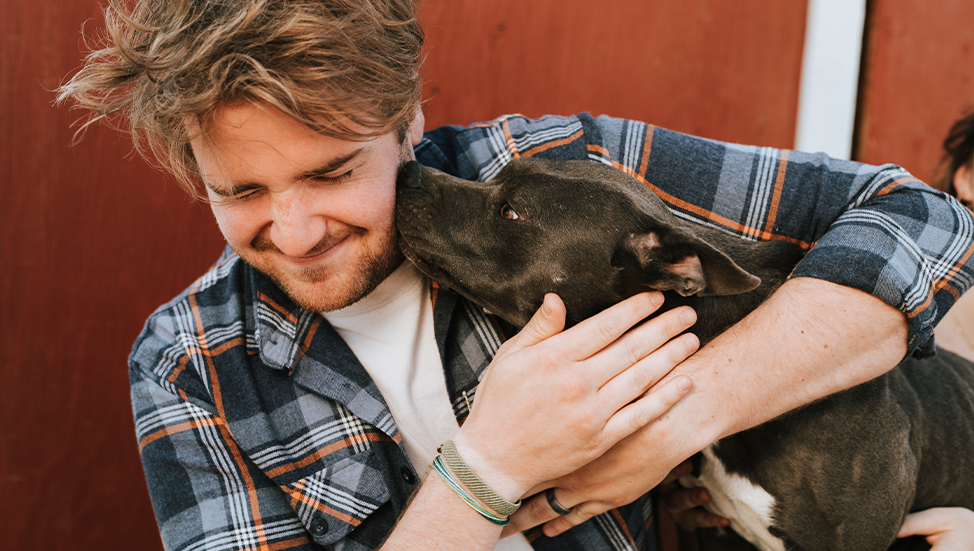Ask Dr. Jenn: What can I do about my dog's bad breath?
Take it from Dr. Jenn that one of the most common complaints from pet owners is that their dog's breath smells. Together, let's learn about the causes of canine halitosis and the recommended at-home remedies.

Q: Why does my dog’s breath stink and what can I do about it?
A: Bad breath, or halitosis, in pets is usually a sign of dental disease. You may notice your dog’s teeth have a brownish build up on them. That brown material is tartar, a mixture of saliva, bacteria, and food particles. The tartar cements on the teeth, causing inflammation and infection in the surrounding gingival tissue. The combination of tartar, gingival inflammation, and infection causes halitosis.
Once tartar has cemented on the teeth, it is difficult to remove at home. Your veterinarian will likely recommend a dental cleaning and comprehensive oral health assessment and treatment (COHAT). A COHAT is similar to our trip to the dentist, with cleaning and polishing of the teeth and x-rays to assess the health of the teeth, the main difference being that animals need to be anesthetized. An ultrasonic scaler is used to remove the tartar from the teeth and hand scalers remove tartar below the gum line. Full mouth dental radiographs (x-rays) are used to assess the health the tooth roots. A dental exam is performed and diseased teeth may be extracted. Finally the teeth are polished. Your pet wakes up with a clean mouth and fresh breath.
Now that your pet has a clean and healthy mouth, preventative care is important to delay recurrence of dental disease and halitosis. The best way to prevent tartar build up is regular brushing. There are many different pet toothbrushes available, including ones that fit on the tip of your finger. Do not use human toothpaste because it contains fluoride and will cause stomach upset. Pet toothpastes are regularly available in pet-friendly flavors such as chicken, beef, malt, and tuna. You will only need to brush the outside of the teeth; the tongue prevents significant buildup on the inside of the teeth.
It is recommended to brush your dog’s teeth daily, but this is unrealistic for most people. Even brushing just a few times a week will be beneficial. If your dog won’t tolerate brushing or if you just don’t have time or motivation, there are plenty of other products available. Additives that you put into your dog’s water will help kill bacteria in the mouth and freshen breath. A product called Vetzlife softens the tartar so that it can more easily be brushed off. Chewing also helps clean the teeth. There are treats that help reduce tartar build up and chew toys that have grooves where toothpaste can be applied.
Special dental diets can help keep your pet’s mouth healthy. Most kibbles crumble when a dog or cat bites them, but these diets are formulated differently so that they shred instead of crumble, giving the food more contact with the teeth so that it scrapes off the debris. Some of these foods also contain a tartar shield. Before changing your pet’s diet, I recommend a conversation with your veterinarian to ensure the new diet is best for your pet’s health.
The most important thing when picking out dental products for your pet is to choose a product approved by the Veterinary Oral Health Council (VOHC). You can find a list of approved products on their website VOHC.org or by looking for the “VOHC accepted” stamp on the product.
Dental health is important for your pet at all stages of life. Even with the best oral care, many pets need dental cleanings multiple times throughout their life. One dental procedure does not prevent your pet from having dental problems in the future. Some pets need dental cleanings every six to twelve months.
Dental disease is by far the most common cause of halitosis in dogs and cats. However, there are other causes, including kidney disease, fractured teeth, foreign material in the mouth, and oral cancer. If you are concerned about your cat or dog’s halitosis, I recommend scheduling an appointment with your veterinarian to determine if your pet needs a dental cleaning and COHAT or if there could be another medical cause.
Give your furry friend a pet from me,
Dr. Jenn
Ready to start saving money on pet wellness care?
Then take a look at Mint Wellness, the pet wellness plan that provides fast reimbursement on routine pet care. Save on vaccinations, wellness exams, preventatives, dental, and more!
Learn More


